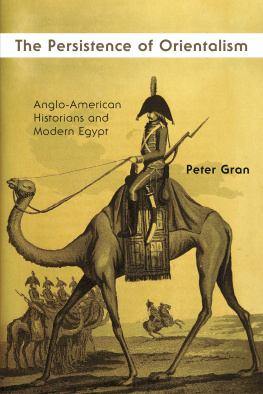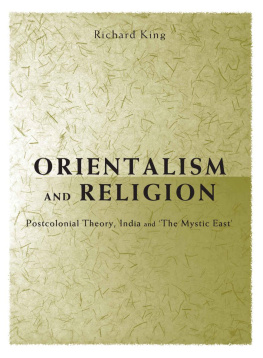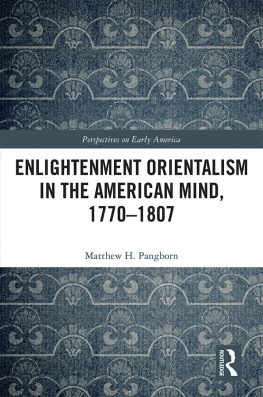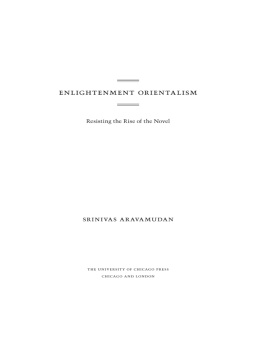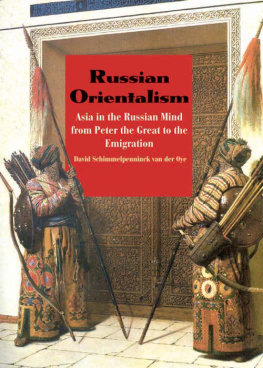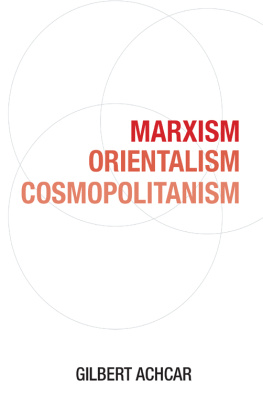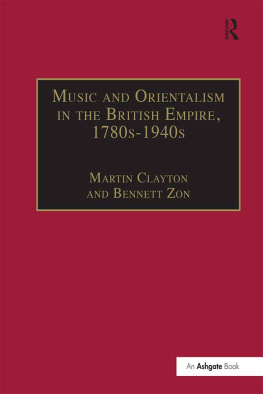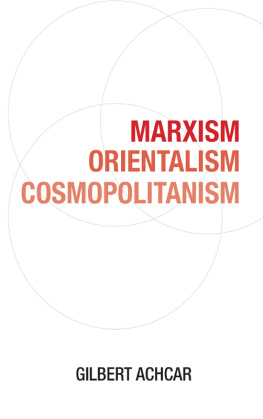Peter Gran - The Persistence of Orientalism
Here you can read online Peter Gran - The Persistence of Orientalism full text of the book (entire story) in english for free. Download pdf and epub, get meaning, cover and reviews about this ebook. year: 2020, publisher: Syracuse University Press, genre: Politics. Description of the work, (preface) as well as reviews are available. Best literature library LitArk.com created for fans of good reading and offers a wide selection of genres:
Romance novel
Science fiction
Adventure
Detective
Science
History
Home and family
Prose
Art
Politics
Computer
Non-fiction
Religion
Business
Children
Humor
Choose a favorite category and find really read worthwhile books. Enjoy immersion in the world of imagination, feel the emotions of the characters or learn something new for yourself, make an fascinating discovery.
- Book:The Persistence of Orientalism
- Author:
- Publisher:Syracuse University Press
- Genre:
- Year:2020
- Rating:3 / 5
- Favourites:Add to favourites
- Your mark:
- 60
- 1
- 2
- 3
- 4
- 5
The Persistence of Orientalism: summary, description and annotation
We offer to read an annotation, description, summary or preface (depends on what the author of the book "The Persistence of Orientalism" wrote himself). If you haven't found the necessary information about the book — write in the comments, we will try to find it.
The Persistence of Orientalism — read online for free the complete book (whole text) full work
Below is the text of the book, divided by pages. System saving the place of the last page read, allows you to conveniently read the book "The Persistence of Orientalism" online for free, without having to search again every time where you left off. Put a bookmark, and you can go to the page where you finished reading at any time.
Font size:
Interval:
Bookmark:

The Persistence of Orientalism
Middle East Studies Beyond Dominant Paradigms
Peter Gran, Series Editor
The Persistence of Orientalism
Select Titles in Middle East Studies Beyond Dominant Paradigms
Artisan Entrepreneurs in Cairo and Early-Modern Capitalism (16001800)
Nelly Hanna
Gender and Class in the Egyptian Womens Movement, 19251939: Changing Perspectives
Cathlyn Mariscotti
The Large Landowning Class and the Peasantry in Egypt, 18371952
Raouf Abbas and Assem El-Dessouky; Peter Gran, ed.; Amer Mohsen with Mona Zikri, trans.
Minorities and the Modern Arab World: New Perspectives
Laura Robson, ed.
Native Tongue, Stranger Talk: The Arabic and French Literary Landscapes of Lebanon
Michelle Hartman
Pragmatism in Islamic Law: A Social and Intellectual History
Ahmed Fekry Ibrahim
The Shiites of Lebanon: Modernism, Communism, and Hizbullahs Islamists
Rula Jurdi Abisaab and Malek Abisaab
Unveiling the Harem: Elite Women and the Paradox of Seclusion in Eighteenth-Century Cairo
Mary Ann Fay
For a full list of titles in this series, visit https://press.syr.edu/supressbook-series/middle-east-studies-beyond-dominant-paradigms/.
of Orientalism
Anglo-American
Historians and
Modern Egypt
Peter Gran

Syracuse University Press
Copyright 2020 by Syracuse University Press
Syracuse, New York 13244-5290
All Rights Reserved
First Edition 2020
202122232425654321
The paper used in this publication meets the minimum requirements of the American National Standard for Information SciencesPermanence of Paper for Printed Library Materials, ANSI Z39.48-1992.
For a listing of books published and distributed by Syracuse University Press, visit https://press.syr.edu.
ISBN: 978-0-8156-3697-7 (hardcover)
978-0-8156-3698-4 (paperback)
978-0-8156-5508-4 (e-book)
Library of Congress Cataloging-in-Publication Data
Names: Gran, Peter, 1941 author.
Title: The persistence of orientalism : Anglo-American historians and modern Egypt / Peter Gran.
Description: First edition. | Syracuse : Syracuse University Press, 2020. | Series: Middle East studies beyond dominant paradigms | Includes bibliographical references and index. | Summary: The Persistence of Orientalism is a study of Anglo-American historiography of modern Egypt, which emphasizes the work done by other professional historians, especially Edward SaidProvided by publisher.
Identifiers: LCCN 2020008444 (print) | LCCN 2020008445 (ebook) | ISBN 9780815636977 (hardcover) | ISBN 9780815636984 (paperback) | ISBN 9780815655084 (ebook)
Subjects: LCSH: EgyptHistoriography. | Orientalism.
Classification: LCC DT76.7 .G73 2020 (print) | LCC DT76.7 (ebook) | DDC 962.05072/41dc23
LC record available at https://lccn.loc.gov/2020008444
LC ebook record available at https://lccn.loc.gov/2020008445
Manufactured in the United States of America
For several decades, the student in modern Egyptian studies has been working in a field with no clear historythat is, with no way to judge where he or she was. Moreover, the field had only one paradigm, and this paradigm failed to account for very much.
Given this situation, this book initially set out to outline the history of American historical studies of modern Egypt, to provide a clearer understanding of the field. This chapter reviews some of the main findings of the book, beginning with the issue of periodization, then moving on to the issue of the Oriental despotism paradigm and identity issues, and, finally, taking up the issue of the role played by the UK in the creation of the field.
The history of the field appears to be comprised of three different, if somewhat overlapping, periods. The first coincided with the heyday of colonialism. In the case of the UK, this extended from the last years of the nineteenth century to the Suez War; in the case of the United States, it only extended to the late 1930s and early 1940s. The second of these periods (the late 1930s to the late 1970s) was bound up with the adjustment to the Cold War, the Development Revolution, the coming of decolonization, and Egyptian independence in 1954. The third period, which began in the 1970s and continues today, has witnessed the fields adjustment to globalization and postcolonial discourse.
The colonial heyday was marked by the British occupation of Egypt. During this time, British officials produced a number of works whose influence came to be felt in American studies of modern Egypt. Cleavages appeared in the field.
In this first period, one could see the beginning of one of the main internal cleavages in the field, one that still exists today. On the one hand, the government wanted policy-oriented knowledge, finding it more useful than the language and area-based expertise possessed by missionaries and then later by professors. On the other hand, many professors were more interested in questions of science than in those of policy. This cleavage was demonstrated quite dramatically by the decision on the part of dominant elements in the United States to align with Great Britain and to rely on its expertise in Middle Eastern affairs in preference to that of American missionaries. More recently, in the year 2001, the government createdor at least gave its blessing toa policy association for Middle East studies set up to address policy concerns still not adequately addressed by the academy.
Following the lead of British scholars, American scholars took the subject of Egypt to be a part of Middle East studies, a framework that included Turkey and Iran. The decision to organize the field within these parameters appears to have been a way of avoiding the need to confront the Arab world of which Egypt would have been a part; in other words, it was much more a matter of divide and rule than of science. As the policy priorities of the early twentieth century were the oil fields and the Palestine Question, Egypt became a subfield in what became Middle East studies.
The second period in the history of the field coincided with the Cold War and with Egyptian independence. The US governments response to the challenges of these years was to create a large number of personnel who could serve in development programs, with the intention of forestalling the spread of communism by encouraging capitalist development. To that end, the government sponsored the creation of Middle East centers in various universities, and Egyptian studies benefited from this development. At this point, students from middle-class backgrounds with no particular connection to the government, the oil industry, or policy studies were encouraged to learn Arabic and other languages and to enter public service. On graduation, some of these students did work for the government, while others found employment in the universities. As a result, the field of Middle East studies became larger and more scientific but less policy driven. Policy centers existed, such as the Middle East Institute in Washington, DC, but by this point the actual field was spread out across the universities, and, for the first time, language skills became a prerequisite for ones research to be taken seriously. Last but not least, the field became much more American and much less British, especially after the Suez War. This period came to an end in the later 1970s, when those inclined toward the scientific end of the field began to produce a critique of US imperialism, at just the time when the government was promoting globalization and neocolonialism.
Font size:
Interval:
Bookmark:
Similar books «The Persistence of Orientalism»
Look at similar books to The Persistence of Orientalism. We have selected literature similar in name and meaning in the hope of providing readers with more options to find new, interesting, not yet read works.
Discussion, reviews of the book The Persistence of Orientalism and just readers' own opinions. Leave your comments, write what you think about the work, its meaning or the main characters. Specify what exactly you liked and what you didn't like, and why you think so.

